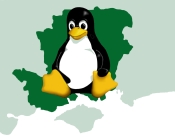|
|
imported from wiki, 22 January 2009
When: 11:00 – 17:30, Saturday 13th December 2008
Where: http://www.surrey.lug.org.uk/cgi-bin/wiki.pl?[[BringABox/UniversityOfSurrey|University Of Surrey]]
Joint meeting with SurreyLUG
Who Was There
What Happened
See Also
imported from wiki, 22 January 2009 MP3 Players
Hardware Media Players
MP3 players are hardware devices to playback compressed sound, and soon possibly video. Initial devices are based on the MP3 codec, but there are other open and closed options, many of which are now considered to be better. See also SoftwareReviews/MediaPlayers for playing back compressed audio on your Linux desktop, and SoftwareReviews/AudioEditing for software to rip and edit your music.
Types
Hard Disk
These devices use a small hard disk to store the compressed data. They have the advantage that cost per byte is lowest, and capacities are high, but [continued…]
imported from wiki, 8 January 2009
When: 10:30 – 16:00, Saturday 04th October 2008
Where: CranbourneCollege, Basingstoke.
Times
Who Was There
What Happened
See Also
imported from wiki, 13 December 2008
This page summarises some members’ opinions of UK ISPs and their attitude towards Linux, in terms of compatibility and support.
Broadband
This encompasses cable and ADSL technologies. For a wider set of reviews of ADSL services, check out http://www.adslguide.org.uk/.
[[http://www.aaisp.net.uk|Andrews and Arnold]]
I also contacted Andrews and Arnold, they are supposed to have an excellent customer service reputation. They were happy for me to use Linux, and they even had a pro Linux page on their site. At the time they were the most expensive, and the ADSL Guide never showed them to be particularly fast, [continued…]
chris.d, 2 November 2008 When: 10:30 – 16:00, Saturday 1 November 2008
Where: SeminarRoom1, Southampton University.
Who Was There
imported from wiki, 1 November 2008
(this page transferred to WordPress 8 Feb 2013)
When: 10:30 – 16:00, Saturday 01st November 2008
Where: SeminarRoom1, Southampton University.
Who Was There
imported from wiki, 12 October 2008
Many Linux distributions come with a web server installed (or it’s very easy to install one).
If you’ve got a web server running and you have no idea why, you have two options:
- Uninstall it.
- Create a webpage on it, and join the world wide web.
There are tons of information sources for website development, and loads of software tools to help you do it, but an ordinary text editor will always be up there with the best of them.
I’ll get to some hints and tips in minute, but first let’s [continued…]
imported from wiki, 10 September 2008
chris.d, 31 August 2008 Book Details
Target Audience
This book is clearly targeted at Unix/Linux system administrators of medium to large sites wishing to learn about system administration primarily with the Cfengine application. Some of the elements of the book are applicable to any system administration scenario but the bulk of the book is Cfengine specific.
This book is an updated revision of [continued…]
imported from wiki, 28 July 2008
The secure shell software, SSH, is usually configured to prompt users for a password when they try to establish a connection to an SSH server. However, there are many circumstances when this presents problems – writing automated system maintenance scripts, for example. Using SSH keys, it is possible to configure SSH and its related commands to allow connections without user intervention.
Getting started with keys and agents
The first thing you should understand before following any of these instructions is that it is not secure to use the client-side tools (keychain, ssh-add, or ssh-agent) on machines where [continued…]
|
|
